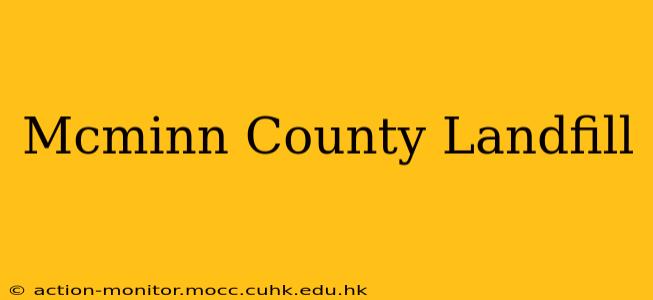The McMinn County Landfill, located in McMinn County, Tennessee, serves as a crucial component of the region's waste management infrastructure. This facility plays a vital role in the responsible disposal of solid waste generated by residents and businesses within the county. Understanding its operations, environmental impact, and future plans is essential for the community.
Landfill Operations and Regulations
The McMinn County Landfill adheres to stringent state and federal regulations governing solid waste disposal. These regulations aim to minimize environmental hazards associated with landfills, including groundwater contamination, leachate production, and methane gas emissions. Key operational aspects include:
- Waste Acceptance Criteria: The landfill specifies the types of waste accepted, often prohibiting hazardous materials, medical waste, and certain other materials. These restrictions are crucial for maintaining environmental safety and operational efficiency.
- Waste Disposal Procedures: Waste is carefully deposited and compacted in designated cells, layered with soil to prevent odor and pest problems. Regular monitoring ensures compliance with environmental standards.
- Leachate Management: Leachate, a liquid that percolates through the waste, is collected and treated to prevent groundwater contamination. This treatment process is an integral part of responsible landfill management.
- Methane Gas Management: Landfills generate methane, a potent greenhouse gas. The McMinn County Landfill likely employs methods to collect and either burn or capture this methane, mitigating its environmental impact.
Environmental Impact and Mitigation
Landfills, while necessary, can have environmental consequences. The McMinn County Landfill's environmental impact is mitigated through various strategies:
- Groundwater Monitoring: Regular testing of groundwater surrounding the landfill helps detect any potential contamination. This proactive monitoring system is critical for early detection and remediation of any problems.
- Erosion and Runoff Control: Measures are in place to prevent soil erosion and control surface runoff, minimizing the potential for pollutants to enter nearby waterways.
- Gas Collection and Control: As mentioned earlier, methane gas collection and management are vital to reduce greenhouse gas emissions.
- Revegetation and Land Reclamation: Efforts are likely undertaken to revegetate areas of the landfill after closure, restoring the land to a more natural state.
Future Plans and Community Engagement
The long-term sustainability of the McMinn County Landfill is dependent on ongoing planning and community engagement. Future plans might include:
- Capacity Expansion: Depending on waste generation rates, future expansion may be considered, but only after careful assessment of environmental impacts and regulatory compliance.
- Waste Reduction Initiatives: Collaboration with the community to promote recycling and waste reduction programs can help extend the landfill's lifespan and reduce environmental impact.
- Public Education: Effective communication with the community about landfill operations and environmental protection measures builds trust and fosters responsible waste management practices.
The McMinn County Landfill represents a critical infrastructure element for waste management in the region. Its responsible operation, environmental stewardship, and commitment to community engagement are vital for ensuring its long-term success. Further information can be obtained through official county sources and relevant environmental agencies.
